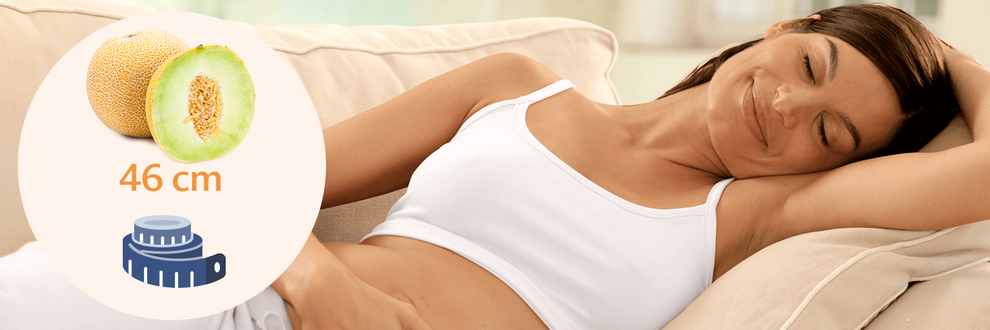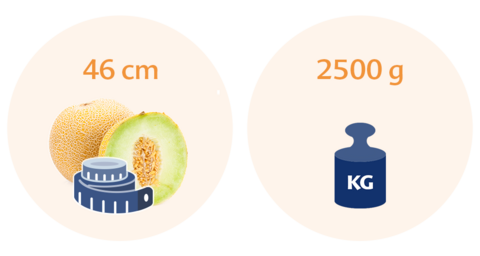Pregnancy weeks:
Week 35 of pregnancy: Your baby’s immune system is now working independently

You’re in the second last week of the ninth month of your pregnancy and in the third trimester. The birth of your child is getting closer and closer, and you and your loved ones will all be hugely excited and impatient to meet them.
Inside your womb, your baby is now preparing to be born.
Size of your baby in week 35

Your baby has gained another centimetre in size and now measures about 46 cm, roughly the same as a honeydew melon. They’ve put on a lot of weight, and now weigh around 2.5 kilograms – not far off their birth weight. Between now and the birth, they’ll continue to build up their protective fat reserves, which will increase their weight to around 3.5 kilograms. However, there are no guarantees: each baby is different, and their actual length and weight will remain a surprise until they’re born (if it’s twins, it’s even more of a surprise as it’s harder to say for certain how long they are and how much they weigh in the womb).
Your baby’s development
Even though your baby can coordinate their movements extremely well in week 35, unfortunately they don’t have much space for them. What they can do is smaller, more subtle actions such as touching their nose, holding the umbilical cord and sucking their thumb.
They also continue to work on their reflexes. If they sense light they will turn towards it, their sucking and grasping reflex is now highly trained, and their breathing reflex is ready to kick in, though the proof of that won’t come until they take their first breath when they’re born.
Your baby’s digestive organs, such as the kidneys and liver, have already started working. They both play an important role in removing toxic substances from the body: the two kidneys get rid of metabolic waste products via urine, while the liver cells store proteins and vitamins which aren’t urgently needed when they’re consumed. The liver converts sugar into glucose and releases it into the bloodstream (a hugely important process for their nutrition once they’re outside the womb), and it produces a viscous substance called bile which is needed to break down food. The bile is stored in the gall bladder until it’s needed in the intestine, and it gives our stools their typical colour.
In your baby’s intestine, a substance called meconium begins to form. This usually consists of swallowed amniotic fluid, the waxy vernix caseosa and the lanugo hair they are shedding, plus the viscous bile which gives the substance its consistency. Meconium is what your baby will excrete in the first few days after the birth.
The immune system in your baby’s body now works independently of your bloodstream. They’ve absorbed all the antibodies they need to build up their immunity, so they’ll be protected from the typical environmental risks once they’re born. However, their immune system is not fully developed yet: it’ll take their body a few years (including exposure to harmful bacteria to become immune to them) to be able to protect itself, so babies and young children are particularly vulnerable to pathogens. Your breast milk, and in particular the form of it called colostrum that you produce at the start, is hugely important as it contains antibodies which will equip them with what they need to develop high immunity.
A baby born prematurely in week 35 would have a very good chance of adapting to the world outside the womb and developing into a normal, healthy human being.
What it’s like for the mum-to-be in week 35
The challenges of advanced pregnancy continue. Moving around, and even just breathing, will get harder and you’ll keep asking ‘How much longer do I have to wait?’.
One consolation is that the breathing difficulties you’re having will ease as your uterus moves down, reducing the pressure on your lungs. However, the false labour that makes this happen, which will begin soon, will mean you feel tightness in your belly, a pulling sensation in your womb, and possibly slight nausea and diarrhoea as well. Unlike real labour, false contractions don’t occur at regular intervals and don’t get more intense or painful, so even though you might not be able to tell if it’s the real thing or not at the start, the intervals will soon tell you which is which.
Common signs and symptoms
In addition to the false contractions you’ll gradually be noticing more and more, which will at least help you breathe a bit more easily, there are a few symptoms in week 35 which can last throughout the final weeks until you give birth.
Bladder weakness
The pressure the uterus puts on your bladder can cause bladder weakness. False labour causes the uterus and your baby to move down towards your lesser pelvis, which increases the pressure on your bladder and makes it smaller. It will therefore fill up more quickly, so you’ll have to go to the toilet even more often.
Circulation problems
Another ongoing symptom is circulation problems. If you’ve been lying down on your back, for instance, you might find that you can’t get up again straight away. This is caused by the pressure your uterus is putting on the vena cava, the vein that supplies blood to the heart: it works less effectively, so less blood and oxygen circulates around your body and you may feel dizzy, light-headed and nauseous at times. Doctors call this “vena cava syndrome”, and if you get it, you should change your sleeping position and get as much rest as you can. For this reason, from week 31 on, it’s recommended that you sleep on your side – if you choose to sleep on your back, then make sure your upper body is raised slightly.
Questions you may want to ask your doctor
Alternative ways to prepare for the birth
As well as perineal massage, there are other ways to prepare for birth that can make it a little easier when the time comes. One simple thing you can do from now on is drink raspberry leaf tea, which will make your birth canal softer and more supple.
Eating linseed every day (you can put it in muesli, for example) also makes the mucous membranes in your body stretchier and more flexible – but make sure that you drink plenty of fluids after eating linseed as it can lead to constipation.
A daily hay flower steam bath has a similar effect: boil some water and mix it in a bowl with dried hay flowers, which you can get from your chemist’s. Let the steam cool a little and put the bowl in the toilet. Then take your clothes off and sit on the toilet for around 20 minutes, so that the steam rises up and reaches your birth canal.
Acupuncture isn’t just useful for treating various symptoms during pregnancy: this oriental therapy is also helpful when preparing to give birth. Around four weeks before your due date, the physician acupuncturist can use needles to stimulate certain points in your body to help the process of giving birth go more smoothly and more quickly. Lots of women have found it to be extremely helpful, so ask your doctor and make an appointment if you think you’d like to try it.



